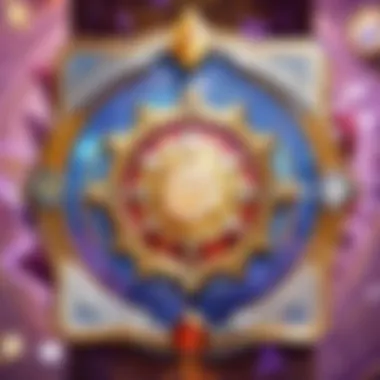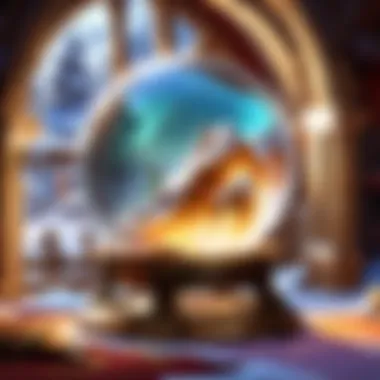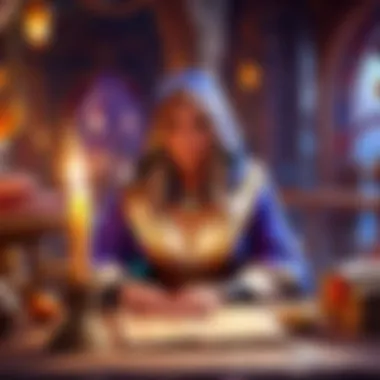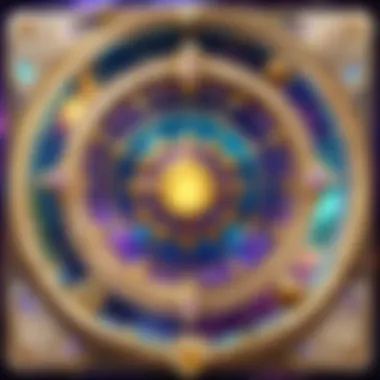Exploring Fortune Telling: History, Methods, and Meaning


Intro
Fortune telling, a practice tracing back to antiquity, remains relevant in contemporary society. This timeless art flourishes within diverse cultural contexts, affecting personal decisions and broader societal narratives. It encompasses various techniques, from tarot reading to astrology, each serving unique functions for individuals seeking understanding of life’s uncertainties.
While skeptics may question its validity, many find comfort and clarity through these practices. This article provides insight into the processes and impacts surrounding fortune telling, considering psychological and philosophical dimensions that contribute to its allure. The unfolding narrative will aim to synthesize historical perspectives and modern interpretations, offering a comprehensive view for readers who desire depth in this multifaceted topic.
Game Updates and Patches
The realm of fortune telling has undergone significant evolution throughout history. Its methodologies and cultural relevance have shifted alongside societal changes. Recent trends reflect a resurgence in interest, driven by an increasing desire for personal connection and self-discovery.
Overview of Recent Developments
Fortune telling has integrated contemporary techniques to appeal to broader audiences. Social media platforms have become vital in disseminating information about these practices. This transition has resulted in a blend of traditional and modern forms, enriching the variety available for seekers.
Impacts on Practice and Popularity
Modern fortune tellers often leverage technology to enhance their services.
- Digital Readings: Fortune tellers offer sessions through video conferencing, allowing access regardless of distance.
- Apps and Online Platforms: Many have developed mobile applications, simplifying the query process and providing automated readings.
- Social Media Influence: Platforms like Instagram, and TikTok create influencers in fortune telling, attracting young audiences curious about spirituality.
The infusion of technology has transformed how individuals engage with these practices, fostering new discussions regarding their legitimacy and social implications.
Cultural Significance
Fortune telling's place in society transcends mere predictions; it often becomes a reflection of cultural values. Its operations can reveal insight into the beliefs that persistently shape identity and future aspirations. For various cultures, specific methods carry unique meanings, further enriching the art. For instance, tarot reading holds deep symbolism in Western cultures, while I Ching reflects profound wisdom prevalent in Eastern traditions.
In many communities, fortune telling serves more than personal purposes; it aligns individuals with shared societal constructs, creating connections amidst life's uncertainties.
Psychological Dimensions
Many who seek fortune telling elucidate deeper psychological needs. These needs range from curiosity to existential inquiry. Engaging with a fortune teller can provide validation or affirmation of one’s feelings and beliefs. Experiencing these insights may foster both immediate relief and long-term reflection.
Historical Context of Fortune Telling
Understanding the historical context of fortune telling is essential for grasping its significance and cultural relevance today. Throughout time, human beings have sought answers from forces beyond their control. Fortune telling has served as a bridge between the known and the unknown, guiding individuals through life's unpredictabilities. Terrestrial events, emotions, and life decisions often draw people toward these practices.
Fortune telling practices have roots in various societies, reflecting their belief systems, cultural nuances, and rites unique to different eras. Insights into its origins can enhance comprehension on how these methods persist and adapt in a larger context.
Origins of Fortune Telling Practices
The origins of fortune telling can be traced back thousands of years to ancient civilizations. People relied on natural phenomena and celestial events to make predictions about future occurrences. Early practices included divinations through signs and the interpretation of dreams. In ancient Mesopotamia, soothsayers and priests occupied a significant role, exploiting omens to provide guidance for their communities.
Chinese I Ching provides historic references to decide outcomes based on the interpretation of hexagrams, while the oracles from ancient Greece exemplified another methodological approach where priestesses delivered prophecies. Always, these practices functioned to alleviate fears and bring a sense of order.
Evolution of Techniques Over Time
As societies evolved, so did the techniques of fortune telling. The art transformed alongside cultural shifts influenced by advancements in knowledge and technology. During the Renaissance, tarot cards emerged, laying groundwork for more structured interpretations in divination. Methods amalgamated; each successive era brought sophisticated understandings of earlier traditions, thus intertwining ancient wisdom with contemporary thought.
Distinct techniques, including astrology, took prominent roles during different periods, based on changing societal values. *Sometimes, imitation of these ancient forms can lead to fluctuations in their initial intent, though their fundamental principle—.faith in an unknown—remains constant.


Regional Variations in Fortune Telling Traditions
Fortune telling is not monolithic; it varies significantly across regions. In North America, tarot readings gained popularity, fueled by New Age beliefs focused on individual growth and introspection. Conversely, in South Asia, astrology carries essential weight, perceived not only for predicting events but as a tool shaped by cultural practices longstanding rooted in familial legacies.
In African communities, divination practices often place emphasis on ancestral spirits and local tradition, intertwining relevance with the social fabric of these societies. These regional variations display cultural complexities and emphasize how fortune telling serves as a reflection of societal needs at different points of its history.
Ultimately, the historical context frames a conversation centered around clarity and social responsibility related to today’s fortune-telling practices.
Understanding Different Modalities
Exploring the various modalities of fortune telling reveals much about its overall impact and relevance in modern society. Each method holds unique significance, catering to diverse preferences and belief systems. Understanding these modalities is key to appreciating how individuals find meaning and comfort in their practice.
Tarot Cards: Symbols and Interpretations
Tarot as a tool is often viewed with mystique. The significance lies in the 78 cards, each containing layered symbols and meanings. Tarot reading establishes a connection between the inquirer and their subconscious. A typical tarot reading involves a layout, or spread, which consists of specific positions each card occupies.
Benefits of tarot include a personal reflection, decision-making guidance, and catharsis. Practitioners and seekers engage deeply with the imagery, exploring interpretations reflective of their circumstances. It serves not only as insight but as a personal narrative where the individual reshapes their journey based on the interpretations they align with. One often encounters resonance in these readings; a term commonly used is 'pulling the card,' when a card signifies noticeable relevance to the person addressed.
Palmistry: Reading Life Lines and Character
Palmistry, or chiromancy, is considered an ancient art of divining information from the lines of the hands. Different lines such as the heart line, head line, and life line represent a spectrum of human experiences and personality traits. Reading a palm involves studying not just these main lines, but also mounts, fingerprints, and the shape of the hand itself.
Various cultures respect palmistry differently. The practice emphasizes intuition and observation. Interpreters must understand nuances in hands across individuals while weaving in skilled reading. Many connect this practice with psychological guidance, and many believe it highlights life opportunities that may be realization rather than being definitive.
Astrology: Influence of Celestial Bodies
Astrology is the study of celestial phenomena and its impact on human affairs. It relies on the positions and movements of planets and stars to interpret potential influences on people's lives. Key components include natal charts, sun signs, lunar placements among others.
Astrology raises discussions about identity, potential, and fate. People often seek astrological insights to channel their understanding and alignment of personal narratives. A prime takeaway from astrology involves acknowledging individual strengths and navigating challenges while fostering a broader perspective of life situations. Its ancient origins contribute a foundational depth to the exploration of existence and social behaviors. Those attuned to astrology may find not only guidance, but awareness of transient life conditions.
Crystal Ball Gazing: An Ancient Practice
Crystal ball gazing, or scrying, involves using reflective surfaces to foresee potential future events and circumstances. Practitioners often concentrate, allowing their perceptions to shift, noting visions or messages received during the process.
The lack of overt detail in this modality can be compelling. Not all experiences appear readable at first glance; deeper analysis sometimes veils the clarity sought. This form of divination can blend intuition with interpretations, delivering clarity in unique ways for an inquiring mind. Despite its mystical outlook, many users report feelings of focus and determination rather than disillusion.
Crystals and reflective materials optimize communal experience for many practitioners, highlighting a sense of connection to both the psychic and societal context of crystal gazing.
Overall, the significance of various fortune-telling methods lies in their ability to support exploration of inner thoughts, societal reflections, and existential musings. Each modality enriches our understanding of fortune telling, emphasizing the dichotomy of human inquiry in navigating complex life experiences.
The Psychological Dimension
The psychological implications of fortune telling are profound and multifaceted. This dimension examines how individuals perceive and interact with fortune telling practices, what motivations drive them toward these methodologies, and the psychological benefits they derive from experiences related to these practices. Unraveling these dimensions explains why fortune telling continues to hold meaning in a technologically advanced society.
Cognitive Dissonance in Belief Systems
Cognitive dissonance is a psychological conflict resulting from simultaneously holding contradictory beliefs or values. In the context of fortune telling, clients may experience dissonance between their rational understanding of reality and the interpretations provided by a fortune teller.
- Engagement in Dissonance: Many clients come seeking validation for decisions or distressing circumstances in their lives. They hope the readings will reinforce positive expectations. When predictions clash with personal ethics or logical reasoning, dissonance may arise. This is typical, particularly when a reading suggests outcomes that pose a dilemma or contradict a pre-existing belief system.
- Indicator of Relevance: Individuals might navigate or manipulate undesirable predictions by focusing on the optimistic parts of the readings. Hence, many tend to grasp onto affirmations, reinforcing the relevance or belief in facts that support their worldview, while the yawning gaps become minimized in their consciousness.


Understanding this friction helps in grasping how fortune telling sustains its place within the complex architecture of belief systems.
Fortune Telling as a Tool for Reflection
Fortune telling often operates as a vital medium for reflection. For many, sessions with palmists or tarot readers prompt reconsideration of choices, future possibilities, and unknown aspects of personal lives. This reflective nature can indeed deeply influence psychological welfare.
- Introspective Process: The consultation process often encourages individuals to explore their innermost desires, fears, and hopes. Discussions about potential futures can trigger memories and reshape insights about personal journeys and interpretations of past experiences.
- Framework for Understanding: When individuals consider guidance offered by a xreader, it instills a structure through which complex feelings might be ordered. In an often-chaotic time, fortune telling provides them a conceptual framework—thus capitalizing on natural human tendencies toward pattern seeking and predictions.
Thus, fortune telling becomes more than a simple prediction, tying it to personal narratives that deeply resonate with those pondering their life direction.
Expectancy and its Influence on Interpretations
Expectancy plays a substantial role in the fortune telling experience. Expectant thought processes can significantly shape how individuals receive and support the information presented to them. Patterns of confirmation biases may strengthen their connection to the Outcomes of a prophecy, advisor’s opinions, or even psychics.
- Confirmation Bias Behavior: Clients often subconsciously disregard critical insights that argue against their expectations. Instead, they seize on details reinforcing their relies in a specific future scenario.
- Control and Satisfaction: Anticipating a particular outcome serves a dual purpose. It builds a connection between a person and their emotion around that desired truth, which may bring about comfort or satisfaction, despite the existence of harsher realities beyond the practitioner’s insight.
This expectancy reinforces not just reliance on the practice, but its shaping of personal realities and future aims.
The psychological dimensions of fortune telling thus provide a rich printout of beliefs and inquiry, making it an area worthy of exploration as society continues to contemplate personal fulfillment and its broader values.
Cultural Significance
Cultural significance is vital for a deeper comprehension of fortune telling. This practice has transcended mere superstition and embraced a wider socio-cultural role. Throughout history, fortune telling has served as more than just a guide for individuals; it has acted as a reflector of collective beliefs, fears, and aspirations.
Fortune telling can function as a cultural barometer, capturing shifts in societal norms and values. By examining tarot cards, astrology, or palmistry within their cultural contexts, we observe how different societies attribute different meanings to the same elements of life. This variance reveals what is central to those cultures—be it fate, free will, or psychological inclinations toward seeking certainty in uncertainty.
Role of Fortune Telling in Society
The role of fortune telling in society is multifaceted. At a surface level, it serves individuals seeking guidance amidst life’s complicated decisions. People frequently look to fortune telling for reassurance, approaches to dilemmas, and insight into their future paths. In doing so, they often discover their own desires, fears, and needs reflected back at them.
Moreover, fortune telling can unite communities. When groups gather for readings or astrological events, profound connections take shape. Boundaries blur as members share stories around common tables, recounting experiences and forging relationships through collective explorations. This collaborative aspect enhances a society’s cultural tapestry.
Cultural Events involving Fortune Telling
- Festivals often incorporate fortune telling practices, recognizing their longstanding significance in traditions.
- Cultural workshops introduce various modalities, like tarot or palmistry, where participants learn together and share unique interpretations.
- Spiritual circles or gatherings harbor the communal nature of fortune telling, where individuals bond through shared introspection.
Fortune Telling in the Modern Era
In recent years, the practice of fortune telling has transitioned into a new age. Technology has significantly changed how people engage with these ancient arts. The importance of this topic lies not only in understanding that many individuals seek insight into their futures but also in recognizing the broader implications of fortune telling in contemporary society. As society evolves, so do its beliefs, methods, and areas of exploration.
Popularization through Technology
Today, technology plays a crucial role in popularizing fortune telling. Unlike the past, when one would visit a local psychic, individuals can now access various services through their smartphones and computers. Mobile apps, websites, and social media have made it simpler to connect with practitioners from around the world. This adavutnce in technology offers several advantages:
- Accessibility: Users can find fortune telling services any time and from anywhere, making it easier to seek advice or reflection.
- Variety: Multiple platforms provide various methods of reading, whether tarot, astrology, or peer-to-peer psychic services.
- Anonymity: Some may feel safer exploring fortune telling online, away from the scrutiny of others.
- Customization: Many services allow the seekers to tailor their experience based on their interests, often leading to more personalized insights.
As technology evolves, fortune telling continues to integrate into digital culture, creating a new realm of exploration for both practitioners and seekers.
The Rise of Online Tarot and Astrological Services


Online tarot and astrological services have steadily gained traction, presenting unique benefits to an engaged audience. These platforms cater to individuals looking for guidance on love, career, and personal growth. Online services offer:
- Convenience: No longer bound by geographic limitations, users can consult talents anywhere in the world with just a few clicks.
- Diverse Offerings: From video calls to written reports, clients can choose their preferred method of consultation.
- Cost-Effectiveness: Online sessions often come at lower prices than in-person visits, appealing to a broader demographic.
- Community: Some websites foster interactive forums for users to discuss experiences, recommendations, and tips.
Developed algorithms also analyze user preferences, suggesting readings or astrologers aligned with individual interests and previous consultations.
Online Fortune Telling taps into the immense potential of digital interfaces to enhance user experience.
As fortune telling integrates deeper into modern society through technology, the desire for knowledge about the self remains a persistent draw for many individuals. In an ever-changing world, fortune telling continues to maintain its appeal, providing solace and insight amidst life's complexities.
Ethical Considerations
Fortune telling operates not merely as a source of entertainment but rather as a nuanced interplay of responsibility and ethics. We find that ethics plays a vital role in preserving the integrity of practices and ensuring that clients are treated with respect and care. Each practitioner should have a clear understanding of their position and the potential influence they wield over individuals seeking guidance. This ensures that interactions remain constructive, safeguarding personal autonomy.
The Responsibility of Practitioners
The responsibility of practitioners in the field of fortune telling cannot be overstated. Investigating one’s approach can greatly affect outcomes, resulting in either genuine support or adverse implications for a seeker. It is crucial for fortune tellers to communicate openly, reminding clients of the subjective nature of interpretations.
Practitioners often play—or are perceived to play—the role of advisors. This perception necessitates a high ethical standard to mitigate the risk of misinterpretation and misguidance. Every reading contains weights of interpretation, hinging on the practitioner’s personal biases and skill sets. Accordingly, sincerity and transparency are critical. Practitioners should explicitly convey their knowledge scope and delineate realistic expectations.
Practitioners must adhere to ethical practices, as their guidance could significantly impact an individual’s decision-making process.
Additionally, practitioners integrating therapeutic elements into their sessions should consider adhering to relevant psychological consensus or educational qualifications. Those engaging in practices like tarot reading can obtain certification from recognized bodies, thereby ensuring professionalism and client comfort.
Navigating Manipulation vs.
Guidance
The line between manipulation and guidance in fortune telling frequently appears thin. Concerns arise when a practitioner exploits the vulnerabilities of the seeker. Such undue influence casts a shadow over the essence of what should be an empowering experience.
Signs of manipulation may manifest through:
- Using language that fosters dependency, undermining independence.
- Encouraging continued consultation instead of aiding individuals to reach conclusions through their insight.
- Misrepresenting the outcomes of a reading.
Conversely, true guidance emphasizes reassurance and helps seekers embrace personal agency. Ethical practitioners support individuals in exploring their options without an overemphasis on a predictive framework. They underline that outcomes are mutable and hinge significantly on personal actions.
To assist clients effectively, it is necessary to disseminate information with humility while ensuring everyone's emotional well-being is preserved. In discerning constructive support from possible coercion, both practitioners and clients must remain vigilant.
Future Trends in Fortune Telling
The realm of fortune telling is on a trajectory that mirrors rapid societal and technological changes. Exploring these future trends is crucial for understanding how this age-old practice will continue to interact with modern society. The methods of divination are not static; they adapt and evolve. This trend reflects broader shifts in collective human belief systems, psychological insights, and technological advancements.
Integrative Approaches in Modern Practice
In the, near future, practitioners of fortune telling might increasingly incorporate integrative approaches that blend traditional methods with contemporary understanding. These could include:
- Holistic Practices: Many communities seek a more multidisciplinary view of fortune telling. Practices like tarot and astrology might intertwine with counseling and psychology, presenting a comprehensive perspective.
- Mindfulness and Well-being: Future practices may place greater emphasis on mental well-being. Guidance not only about future possibilities but also on present psychological states could emerge prominently.
- Tech-infused Readings: The utilization of apps and software can facilitate real-time readings and enriched experiences, allowing for wider reach and quick responses.
These integrative approaches suggest a shift toward elevated responsibility in offering insights while deepening connections with clients. This can promote healthier expectations and improved understanding of oneself.
Potential Scientific Investigations
As fortune telling continues to gain traction in contemporary culture, it raises the possibility for scientific examination. Investigating fortune telling from a scientific lens may yield interesting insights:
- Analysis of Psychological Effects: Future research could focus on how different modalities of fortune telling affect an individual's behavior, emotional status, and decision-making processes.
- Longitudinal Studies: Conducting long-term studies might reveal patterns in beliefs and outcomes related to readings. For example, correlating statistical data on predictions with actual life outcomes.
- Evaluation of Modalities: Understanding how specific methods, when combined, can lead to clearer or more meaningful guidance can be explored. This could also promote understanding of limitations and possibilities.
The convergence of science and fortune telling can illuminate the nature of belief and insight, advancing comprehension of this enigmatic practice in contexts previously overlooked.







